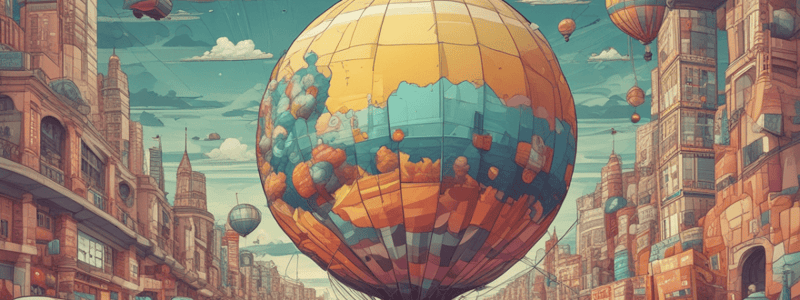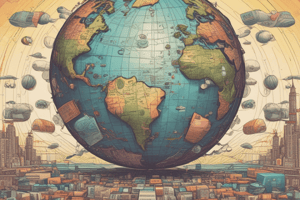Podcast
Questions and Answers
What is a consequence of high inflation on decision makers?
What is a consequence of high inflation on decision makers?
- They focus on investing in foreign currency
- They increase their savings in fixed deposits
- They become more concerned with seeking profitable new production opportunities
- They become more concerned with anticipating inflation (correct)
What is a result of inflation on people's behavior?
What is a result of inflation on people's behavior?
- They invest in productive activities such as new factories and machinery
- They save more in traditional forms such as fixed deposits
- They reduce their consumption of goods and services
- They engage in speculative practices such as speculating in shares and foreign currency (correct)
How does inflation affect savings?
How does inflation affect savings?
- It reduces the value of existing savings (correct)
- It has no effect on savings
- It encourages saving in traditional forms
- It increases the value of existing savings
What is a consequence of high inflation on South Africa's international competitiveness?
What is a consequence of high inflation on South Africa's international competitiveness?
Why do people become unhappy during periods of inflation?
Why do people become unhappy during periods of inflation?
Why does the South African government aim to keep inflation between 3-6%?
Why does the South African government aim to keep inflation between 3-6%?
What is inflation often described as?
What is inflation often described as?
What does the Consumer Price Index (CPI) reflect?
What does the Consumer Price Index (CPI) reflect?
How is inflation calculated?
How is inflation calculated?
What is the main limitation of the Monetarist Approach to explaining inflation?
What is the main limitation of the Monetarist Approach to explaining inflation?
What causes Demand-Pull Inflation?
What causes Demand-Pull Inflation?
What is the result of Demand-Pull Inflation?
What is the result of Demand-Pull Inflation?
What is the main characteristic of inflation?
What is the main characteristic of inflation?
Why are there multiple approaches to explaining inflation?
Why are there multiple approaches to explaining inflation?
What is the main reason for cost-push inflation?
What is the main reason for cost-push inflation?
What is the major problem with demand-pull and cost-push inflation?
What is the major problem with demand-pull and cost-push inflation?
What is the term used to describe the situation where a country imports oil and experiences a rise in prices due to a war in the Middle East?
What is the term used to describe the situation where a country imports oil and experiences a rise in prices due to a war in the Middle East?
According to the Structuralist approach, what are the three interrelated sets of factors that result in inflation?
According to the Structuralist approach, what are the three interrelated sets of factors that result in inflation?
What is the primary cause of inflation according to the Conflict Approach?
What is the primary cause of inflation according to the Conflict Approach?
What is one of the distribution effects of inflation?
What is one of the distribution effects of inflation?
Which of the following is NOT a set of effects of inflation?
Which of the following is NOT a set of effects of inflation?
What is the result of a country experiencing a rise in prices due to a war in the Middle East, if the money supply stays constant?
What is the result of a country experiencing a rise in prices due to a war in the Middle East, if the money supply stays constant?
What is the primary goal of policymakers in relation to inflation?
What is the primary goal of policymakers in relation to inflation?
What is the relationship between the rate of growth in the real national income and the rate of growth of the total effective claims on this income, according to the Conflict Approach?
What is the relationship between the rate of growth in the real national income and the rate of growth of the total effective claims on this income, according to the Conflict Approach?
Flashcards are hidden until you start studying
Study Notes
Introduction to Inflation
- Inflation is a state of economy where there are constant and significant increases in the general price level.
- It is measured using the Consumer Price Index (CPI), which reflects the cost of a representative basket of goods and services.
- Inflation is calculated by taking the percentage change in the CPI over a period of time (not less than a year).
Causes of Inflation
- There are four approaches to explain the causes of inflation: Monetarist, Demand-Pull and Cost-Push, Structuralist, and Conflict approaches.
- Monetarist Approach: Regards inflation as a purely monetary phenomenon, where sustained high rates of monetary growth cause high inflation.
- Demand-Pull and Cost-Push Approach:
- Demand-Pull Inflation: Occurs when aggregate demand for goods and services increases while aggregate supply remains unchanged, leading to excess demand that pulls up prices.
- Cost-Push Inflation: Triggered by increases in the cost of production, which pushes up price levels.
- Structuralist Approach: Inflation is the result of the interaction between three interrelated sets of factors: underlying, initiating, and propagating factors.
- Conflict Approach: Inflation is a symptom of a fundamental disharmony in society, resulting from a continuous imbalance between the rate of growth in real national income and the rate of growth of total effective claims on this income.
Effects of Inflation
- Distribution Effects:
- Inflation benefits debtors at the expense of creditors.
- Inflation tends to redistribute income and wealth from the elderly to the young.
- Redistribution from the private sector to the government.
- Economic Effects:
- Anticipating inflation can lead to decision-makers becoming more concerned with anticipating inflation than seeking profitable new production opportunities.
- Speculative practices may occur, where people engage in speculative activities instead of productive investments.
- Inflation can discourage saving by reducing the value of existing savings.
- Balance of payment problems can arise, where inflation increases the costs of export industries and import-competing industries.
- Social and Political Effects:
- Price increases can make people unhappy, leading to blame-shifting among different groups in society.
Studying That Suits You
Use AI to generate personalized quizzes and flashcards to suit your learning preferences.




